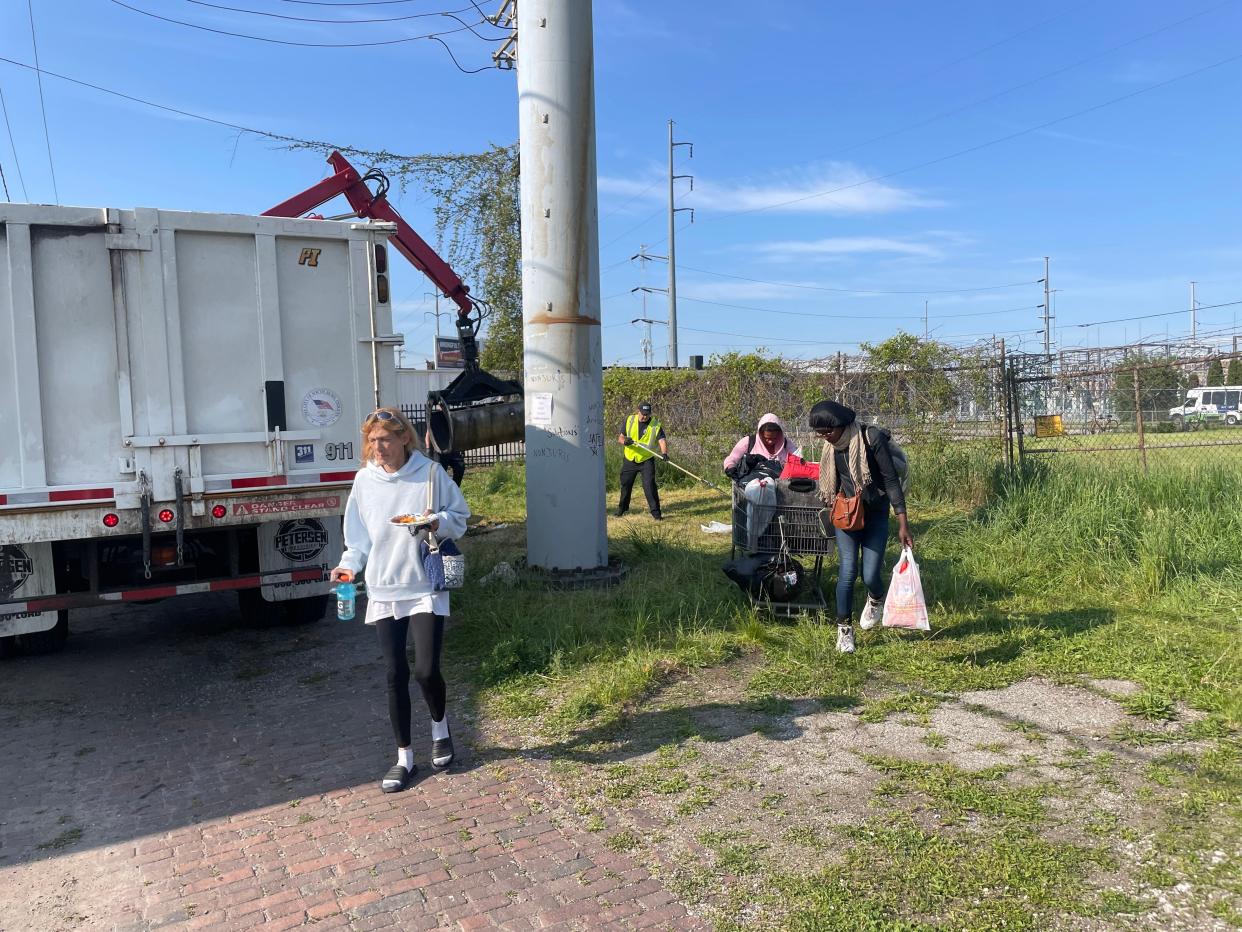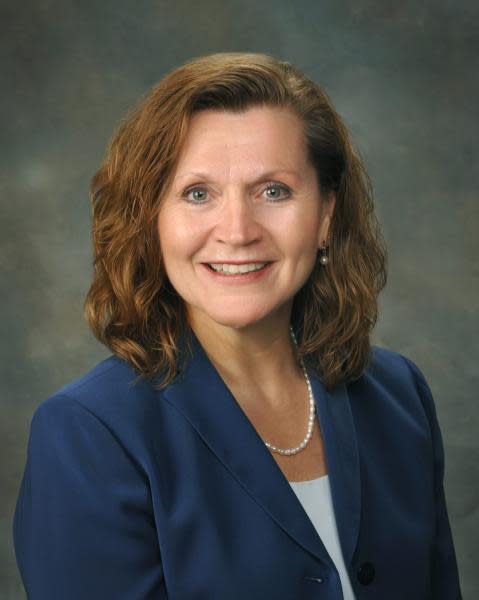South Bend law would make 'homelessness' a protected class, prohibit discrimination

SOUTH BEND — A city councilwoman wants to add “homelessness” as a protected class under South Bend’s human rights ordinance as social workers report an influx of people who are unhoused this year.
Lori Hamann, an at-large member of the South Bend Common Council, is proposing that homelessness be included alongside categories such as race, disability, religion or sexual orientation and gender identity under a revised city statute.
These classes are protected from discrimination in employment, education, housing and access to public accommodations. Public accommodations include public facilities and privately owned businesses used by the public at large, including restaurants, hotels, stores and movie theaters.
Ahead of a Monday meeting where councilors will vote on Hamann’s resolution, some of her colleagues and the mayor have shared doubts about using this legal method to address problems resulting from homelessness.
What South Bend homeless proposal seeks to address
Hamann says change is most needed in the realms of employment and housing.

Citing a Yale University study, Hamann says the stigma against homelessness means job-seekers are less likely to be chosen for a role when they can’t share a permanent address or their address is a homeless shelter. When someone experiencing homelessness gets a job, the study finds, they often face harassment when colleagues learn of their housing situation.
May 2023: South Bend forces homeless camp to disperse, highlighting need for emergency housing
In the search for housing, the new ordinance would aim to protect people who earn enough income to pay rent but are stymied by landlords who won’t look beyond a gap in their rental history, Hamann said.
In the event of unfair treatment, members of protected groups can file complaints for review by the South Bend Human Rights Commission. Hamann said several homeless job-seekers have tried to start cases with the HRC under the current ordinance, but to no avail because homelessness isn’t a designated category.
“People call the HRC and say, ‘I was fired explicitly because I was homeless, and they said I’m not clean enough to work at a restaurant,’” Ricky Herbst, a member of the HRC oversight board and a trained attorney, said during a Thursday meeting about Hamann’s proposal.
Annual count shows more people in St. Joseph County are homeless
Hamann said the need is dire because an annual nationwide count of people experiencing homelessness in St. Joseph County, conducted on a single day each January, increased by 82 people from last year to 551 people in 2023.
The prior high recorded in 2020 was 516 people. The number fell to 469 people last year. Counts can fluctuate with seasonal and other variations, including the number of volunteers who hit the streets to survey people or whether people stay in well-known spots.
In 2023, the federally mandated count included 499 people in emergency shelters or transitional housing and 52 people who are unsheltered. The number of people who are chronically homeless, which means they've been unhoused for more than 12 months, jumped from 94 to 118.
“We need policy and we need approaches that are actually going to make a difference,” Hamann said. “And I think part of that is supporting people that have housing insecurity in the workplace so that they can begin to earn a living and try to lift themselves out of their current situation.”
What laws other cities, states have passed around homelessness
The Washington D.C. city council may be the only legislative body that defines people experiencing homelessness as a protected class.
As of Oct.1, 2022, it’s illegal in D.C. for employers, educational institutions, government agencies, insurers and owners of housing or commercial space to discriminate against people who are homeless. Members of this group also can’t be denied “the full and equal enjoyment” of public accommodations. Violators can be penalized by a city commission tasked with investigating.
The D.C. law followed a 2014 report by the National Coalition for the Homeless that found more than 70% of unhoused people felt they had been discriminated against by private businesses. Two-thirds said law enforcement discriminated against them. Respondents reported being unfairly turned away from coffee shops or harassed by police.
'Radical hospitality': What South Bend's homelessness coordinator learned at his service-focused church
Several states and cities have passed laws that create a “homeless bill of rights.” Rhode Island was the first state to do so in 2012. Illinois and Connecticut followed suit in 2013.
In 2015, Indianapolis became one of the first cities in the country to pass its own homeless bill of rights. The city’s policy, last amended in 2021, grants unhoused people the right to free movement in public spaces, equal treatment by city agencies and emergency medical care, among other protections.
A key portion of the law makes it more difficult for Indianapolis agencies to shut down established homeless encampments. Officials must give displaced residents a 15-day notice, offer to maintain their belongings for 60 days and offer them some form of housing.
Hamann said she hopes to introduce a homeless bill of rights in the future. She’s newly motivated by proposals in nearby cities to ban people who are homeless from camping on public property.
A law passed in Goshen this May bans camping and the storage of personal items on city property if space is available in homeless shelters. A bill introduced Monday in Elkhart would do the same.
The policies are billed as ways to encourage people who are chronically homeless to seek services, but Hamann labels them “anti-homeless” legislation.
Proposal to make homelessness a protected class lacks support
But the councilwoman’s proposal to make homelessness a protected class may stall because some council colleagues and South Bend Mayor James Mueller aren’t yet convinced.
During discussion of the bill Thursday, councilors Rachel Tomas Morgan and Eli Wax said they agree with the bill’s intent to ban discrimination. But they worry housing status is an imprecise class compared to identity characteristics like race, religion or sexual orientation.
None of the other six councilors showed up to the Thursday meeting. Hamann said she's reached out to all relevant parties at least twice but hasn't received any responses.

Mueller indicated that he doesn't expect most councilors to support the proposal.
In a phone interview with The Tribune, Mueller said homelessness “does stick out in many ways from the other protected classes in the municipal code.”
"There needs to be a lot more work and a lot more conversation before I believe this is ready to move in any way," he added.
Mueller said his administration’s focus is to help people experiencing homelessness by supporting housing-first efforts. The approach relies on evidence that people are better equipped to recover from addiction or mental health issues once they live in stable housing.
IF YOU GO
WHAT: The South Bend Common Council will hold a committee hearing on Monday, July 24, to discuss an amendment that would make “homelessness” a protected class under the city’s human rights ordinance.
WHEN: The Health and Public Safety committee will hear the proposal at 4 p.m. If the bill is voted out of committee, a final vote will occur during the 7 p.m. council meeting.
WHERE: Attend in person at the council chambers, located on the 4th floor of the County-City Building at 227 W. Jefferson Blvd. in South Bend. Watch and comment online at https://tinyurl.com/07242023CC.
Email city reporter Jordan Smith at JTsmith@gannett.com. Follow him on Twitter: @jordantsmith09
This article originally appeared on South Bend Tribune: South Bend Common Council to consider 'homelessness' as a protected class

